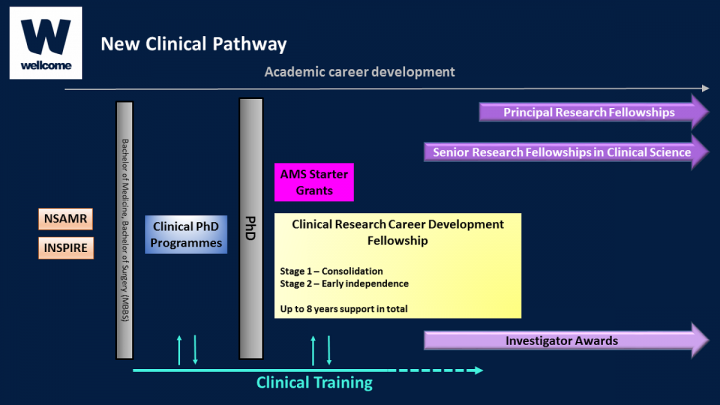UK training structures 2
Interested to see how ECAT fits into the bigger picture?
UK Training Structures
The career paths for academic training in Scotland and in England are broadly comparable but with a few differences which have resulted in a more “bespoke” approach in Scotland.
How it works – in England
Trainees undergo foundation training and, in most specialties, compete for Core Training posts before being appointed to Specialty Registrar (StR) training with a NTN. The popular time to step ‘out of programme’ for a 3 year PhD fellowship is during StR training, after securing a NTN.
The recommendations of the Walport review were adopted as part of setting up the National Institute of Health Research (NIHR) in England and provide a clinical academic training pathway:
Academic Foundation programmes provide opportunities for research training during pre-registration years.
NIHR Academic Clinical Fellowships (known as ACFs) provide an ‘academic’ NTN (NTN-A) and combine early clinical training with a few months of research experience before applying for a competitive PhD Fellowship. These posts are allocated to individual specialties in specific centres, so it is not possible to obtain an ACF in every discipline in every centre. ACFs are 3 year posts which aim to prepare medical trainees for applying for a competitive PhD fellowship such as a Clinical Research Training Fellowship.
NIHR Academic Clinical Lectureships (known as ACLs) are designed for post-doctoral researchers to maintain 50:50 research:clinical time.
How it works – in Scotland
Reforms to clinical academic training in Scotland are led by the Scottish Clinical Research Excellence Development Scheme (SCREDS) group within NHS Education for Scotland.
Academic Foundation programmes exist in all five medical schools (Edinburgh, Glasgow, Dundee, Aberdeen & St Andrews).
Instead of seeking NTNs for ACFs that are restricted to individual specialties in individual centres, everyone applies for NTNs in the open NHS competition. Once you hold a NTN, no matter what specialty you are in you can apply to join a pre-doctoral academic scheme such as the ECAT Lectureship scheme, or apply for PhD funding from the Wellcome Trust, MRC and other charitable foundations.
An expanded number of SCREDS Lectureships were created for post-doctoral clinical academic career development. These are deployed flexibly according to need within each postgraduate deanery.
The importance of external fellowships
Competitive funding is available for fellowships to support a PhD (Training Fellowships), post-doctoral training (Intermediate Fellowships/Clinician Scientist Fellowships) or your development as a senior independent researcher (Senior Research Fellowships).
These are not only important markers of esteem, but they provide resources and time for you to undertake parallel research and clinical training as a super-numerary member of your clinical department. The most successful clinical academics almost invariably graduate through these fellowships.
Wellcome Trust Clinical Research Career Development Fellowships
This Wellcome Trust scheme enables medical, dental, veterinary and clinical psychology graduates to continue their research at postdoctoral level and develop scientific independence. It provides support for up to eight years and the flexibility to balance research and clinical responsibilities.
In most cases:
- Stage 1 funding will range from £80,000 to £140,000 a year
- Stage 2 funding will range from £160,000 to £250,000 a year
You can apply for a Clinical Research Career Development Fellowship if you’ve completed your thesis for a higher degree (preferably a PhD). If you're currently writing your thesis, you must have submitted it by the full application deadline. You must want a clinical academic career. Further information about the Wellcome Trust Clinical Research Career Development Fellowships scheme is available on the Wellcome Trust's website.


